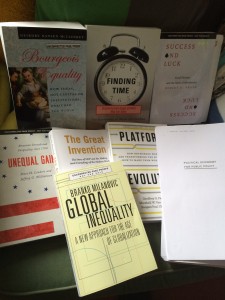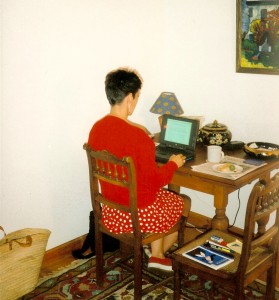I was reminded by this article about a hoax submission to the annual international conference of the Society for Social Studies of Science, purporting to be a paper proposed for a panel called ‘On the Absence of Absences’. Author Peter Dreier writes: “I not only wanted to see if I could fool the panel organizers and get my paper accepted, I also wanted to pull the curtain on the absurd pretentions of some segments of academic life. To my astonishment, the two panel organizers—both American sociologists—accepted my proposal.” As he recounts, having jumbled pretentious jargon words together for an abstract, he simply didn’t go to the conference, thus becoming an Absence. Maybe some of the conference participants thought that was intentional.
The account cites the 1997 book [amazon_link id=”B00ENKP2TM” target=”_blank” ]Intellectual Impostures[/amazon_link] by Alan Sokal and Jean Bricmont (1998 in English). Sokal, a physicist, submitted a parody article to the American cultural studies journal Social Text, titled ‘Transgressing the Boundaries: towards a transformative hemeneutics of quantum gravity.’ It claimed reality (eg gravity) is a social construct. The article was published – in a special edition of Social Text “devoted to rebutting the criticisms leveled against post-modernism and social constructivism by several distinguished scientists.” Talk about irony.
[amazon_image id=”B00ENKP2TM” link=”true” target=”_blank” size=”medium” ]INTELLECTUAL IMPOSTURES Postmodern Philosophers’ Abuse of Science.[/amazon_image]
Sokal immediately revealed the hoax, and he and Bricmont use the book to evaluate the consequent firestorm and to drive home their argument that postmodernists abuse concepts and terms from maths and physics (eg Baudrillard claiming modern warfare takes place on non-Euclidean space, Lacan stating that the structure of the neurotic subject is ‘exactly the torus’ etc. Sokal and Bricmont make clear they are not attacking all social science, or all French or structuralist philosophy. For example, they point out that Derrida does not write the meaningful drivel they attack, although Deleuze, Kristeva, Lacan do. The bulk of the book analyses a number of offending texts. I read it at the time, and thoroughly enjoyed the demolition job. While respecting the necessity of jargon in academic disciplines, I was predisposed to agree that much of the cultural studies material I occasionally read was literally meaningless.
It ends with an epilogue making some key points, including: It’s a good idea to understand what one is talking about if using scientific terms, even in a loosely metaphorical way; not all that is obscure is profound; science is not a ‘text’, reality and evidence exist (even though their perception and discussion is socially shaped); etc. They end by asking – does it matter? Is postmodernism the biggest problem facing the world?
Sokal and Bricmont conclude that the spread via academia of an absence, the absence of clear thinking and respect for empiricism, is a serious issue. And the obscurantism and pretentiousness of the intellectual/academic left – which has not abated since 1997, as the Peter Dreier experiment indicates – has contributed to the populism rampant today, and the evident preference of voters who are not well-off, privileged or highly educated for people who do ‘speak their language’.


